译林牛津初三中考英语复习资料-精讲
- 格式:doc
- 大小:737.61 KB
- 文档页数:12

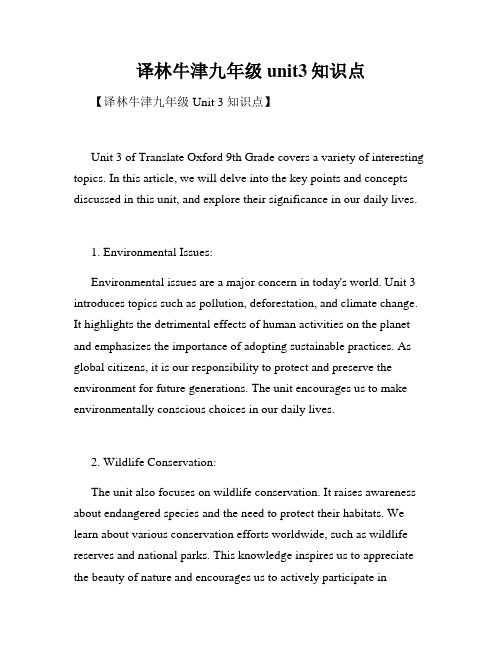
译林牛津九年级unit3知识点【译林牛津九年级 Unit 3 知识点】Unit 3 of Translate Oxford 9th Grade covers a variety of interesting topics. In this article, we will delve into the key points and concepts discussed in this unit, and explore their significance in our daily lives.1. Environmental Issues:Environmental issues are a major concern in today's world. Unit 3 introduces topics such as pollution, deforestation, and climate change. It highlights the detrimental effects of human activities on the planet and emphasizes the importance of adopting sustainable practices. As global citizens, it is our responsibility to protect and preserve the environment for future generations. The unit encourages us to make environmentally conscious choices in our daily lives.2. Wildlife Conservation:The unit also focuses on wildlife conservation. It raises awareness about endangered species and the need to protect their habitats. We learn about various conservation efforts worldwide, such as wildlife reserves and national parks. This knowledge inspires us to appreciate the beauty of nature and encourages us to actively participate inconservation initiatives. By understanding the fragility of ecosystems, we develop a sense of empathy towards all living creatures.3. Historical Events:In Unit 3, we explore significant historical events that have shaped the world we live in today. From the French Revolution to the Industrial Revolution, we delve into the causes, consequences, and key figures involved in these transformative periods. Through these historical narratives, we gain a deeper understanding of the societal, economic, and political developments that have brought us to the present day. We realize the value of learning from the past to create a better future.4. Literary Analysis:Unit 3 also delves into the realm of literature, introducing us to classic and contemporary works. We engage in literary analysis, exploring themes, characters, and symbolism. By interpreting and critically analyzing texts, we develop our ability to think critically and communicate effectively. Literature expands our imagination and broadens our horizons, enabling us to empathize with diverse perspectives and ideas.5. The Power of Language:Language plays a central role in Unit 3. We explore how language can shape our society and influence our perception of the world. Through discussions on media and advertising, we examine how language can be used to manipulate opinions and reinforce societal stereotypes. We are challenged to become discerning consumers of information, questioning the messages conveyed through language and media.6. Cultural Diversity:Unit 3 celebrates the richness of different cultures and emphasizes the importance of cultural diversity. We learn about different customs, traditions, and rituals from around the world. By appreciating cultural diversity, we broaden our understanding of the global community and nurture respect for different perspectives. This knowledge enables us to become more empathetic and open-minded individuals.In conclusion, Unit 3 of Translate Oxford 9th Grade introduces us to a range of thought-provoking topics. From environmental issues to historical events, literature, language, and cultural diversity, each theme offers valuable insights that expand our knowledge and shape our worldview. By engaging with these concepts, we develop critical thinking skills, empathy, and a sense of global citizenship. Through ourlearning in Unit 3, we are empowered to create positive change in the world around us.。
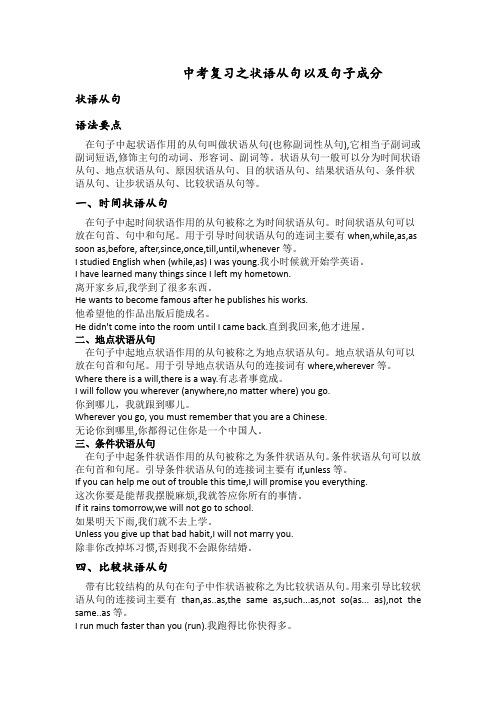
中考复习之状语从句以及句子成分状语从句语法要点在句子中起状语作用的从句叫做状语从句(也称副词性从句),它相当子副词或副词短语,修饰主句的动词、形容词、副词等。
状语从句一般可以分为时间状语从句、地点状语从句、原因状语从句、目的状语从句、结果状语从句、条件状语从句、让步状语从句、比较状语从句等。
一、时间状语从句在句子中起时间状语作用的从句被称之为时间状语从句。
时间状语从句可以放在句首、句中和句尾。
用于引导时间状语从句的连词主要有when,while,as,as soon as,before, after,since,once,till,until,whenever等。
I studied English when (while,as) I was young.我小时候就开始学英语。
I have learned many things since I left my hometown.离开家乡后,我学到了很多东西。
He wants to become famous after he publishes his works.他希望他的作品出版后能成名。
He didn't come into the room until I came back.直到我回来,他才进屋。
二、地点状语从句在句子中起地点状语作用的从句被称之为地点状语从句。
地点状语从句可以放在句首和句尾。
用于引导地点状语从句的连接词有where,wherever等。
Where there is a will,there is a way.有志者事竟成。
I will follow you wherever (anywhere,no matter where) you go.你到哪儿,我就跟到哪儿。
Wherever you go, you must remember that you are a Chinese.无论你到哪里,你都得记住你是一个中国人。
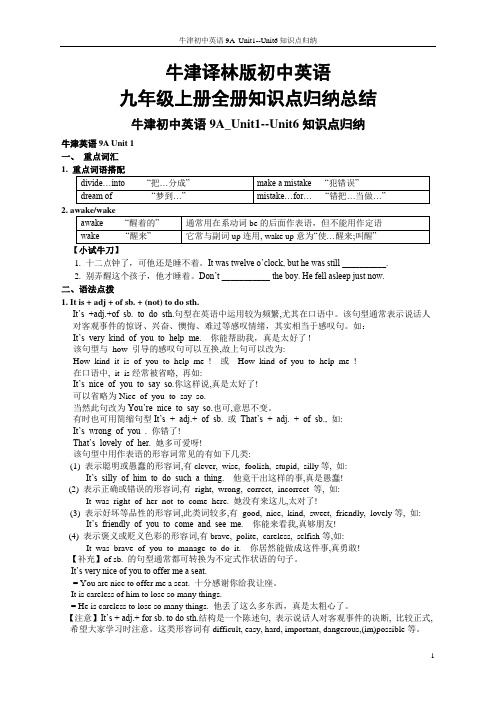
牛津译林版初中英语九年级上册全册知识点归纳总结牛津初中英语9A_Unit1--Unit6知识点归纳牛津英语9A Unit 1一、重点词汇1.【小试牛刀】1. 十二点钟了,可他还是睡不着。
It was twelve o’clock, but he was still __________.2. 别弄醒这个孩子,他才睡着。
Don’t ___________ the boy. He fell asleep just now.二、语法点拨1. It is + adj + of sb. + (not) to do sth.It’s +adj.+of sb. to do sth.句型在英语中运用较为频繁,尤其在口语中。
该句型通常表示说话人对客观事件的惊讶、兴奋、懊悔、难过等感叹情绪,其实相当于感叹句。
如:It’s very kind of you to help me. 你能帮助我,真是太好了!该句型与how 引导的感叹句可以互换,故上句可以改为:How kind it is of you to help me ! 或How kind of you to help me !在口语中, it is经常被省略, 再如:It’s nice of you to say so.你这样说,真是太好了!可以省略为Nice of you to say so.当然此句改为You’re nice to say so.也可,意思不变。
有时也可用简缩句型It’s + adj.+ of sb. 或That’s + adj. + of sb., 如:It’s wrong of you . 你错了!That’s lovely of her. 她多可爱呀!该句型中用作表语的形容词常见的有如下几类:(1) 表示聪明或愚蠢的形容词,有clever, wise, foolish, stupid, silly等, 如:It’s silly of him to do such a thing. 他竟干出这样的事,真是愚蠢!(2) 表示正确或错误的形容词,有right, wrong, correct, incorrect 等, 如:It was right of her not to come here. 她没有来这儿,太对了!(3) 表示好坏等品性的形容词,此类词较多,有good, nice, kind, sweet, friendly, lovely等, 如:It’s friendly of you to come and see me. 你能来看我,真够朋友!(4) 表示褒义或贬义色彩的形容词,有brave, polite, careless, selfish等,如:It was brave of you to manage to do it. 你居然能做成这件事,真勇敢!【补充】of sb. 的句型通常都可转换为不定式作状语的句子。
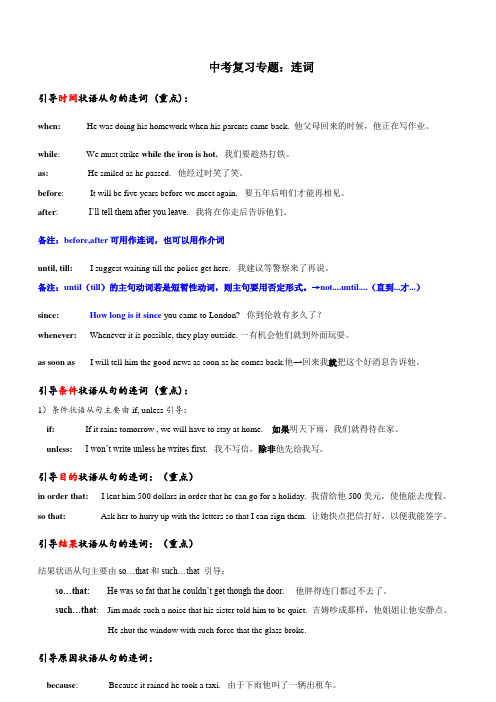
中考复习专题:连词引导时间状语从句的连词 (重点):when:He was doing his homework when his parents came back. 他父母回来的时候,他正在写作业。
while: We must strike while the iron is hot.我们要趁热打铁。
as:He smiled as he passed. 他经过时笑了笑。
before: It will be five years before we meet again. 要五年后咱们才能再相见。
after: I’ll tell them after you leave.我将在你走后告诉他们。
备注:before,after可用作连词,也可以用作介词until, till:I suggest waiting till the police get here. 我建议等警察来了再说。
备注:until(till)的主句动词若是短暂性动词,则主句要用否定形式。
→not....until....(直到...才...)since:How long is it since you came to London? 你到伦敦有多久了?whenever:Whenever it is possible, they play outside. 一有机会他们就到外面玩耍。
as soon as I will tell him the good news as soon as he comes back.他一回来我就把这个好消息告诉他。
引导条件状语从句的连词 (重点):1)条件状语从句主要由if, unless引导:if:If it rains tomorrow , we will have to stay at home. 如果明天下雨,我们就得待在家。
unless:I won’t write unless he writes first.我不写信,除非他先给我写。
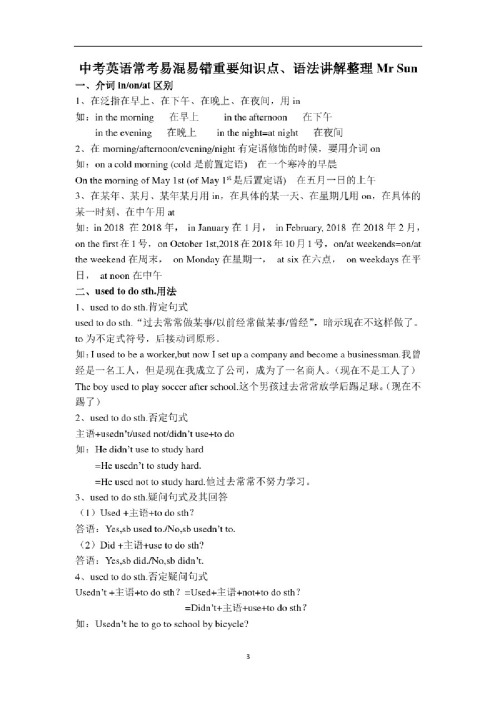
中考英语常考易混易错重要知识点、语法讲解整理Mr Sun一、介词in/on/at区别1、在泛指在早上、在下午、在晚上、在夜间,用in如:in the morning在早上in the afternoon在下午in the evening在晚上in the night二at night在夜间2、在morning/afternoon/evening/night有定语修饰的时候,要用介词on如:on a cold morning(cold是前置定语)在一个寒冷的早晨On the morning of May1st(of May1"是后置定语)在五月一日的上午3、在某年、某月、某年某月用in,在具体的某一天、在星期儿用。
n,在具体的某一时刻、在中午用at如:in2018在2018年,in January在1月,in February,2018在2018年2月,on the first在1 号,on October1st,2018在2018年10月1号,on/at weekends=on/at the weekend在周末,on Monday在星期一,at six在六点,on weekdays在平日,at noon在中午二、used to do sth.用法1、used to do sth.肯定句式used to do sth.“过去常常做某事/以前经常做某事/曾经”,暗示现在不这样做了。
to为不定式符号,后接动词原形。
如:I used to be a worker,but now I set up a company and become a businessman.It曾经是一名工人,但是现在我成立了公司,成为了一名商人。
(现在不是工人了)The boy used to play soccer after school.这个男孩过去常常放学后踢足球。
(现在不踢了)2、used to do sth.否定句式iin+usedift/used not/didn't use+to do如:He didn't use to study luird=He usedn't to study hard.=He used not to study hard.他过去常常不努力学习。

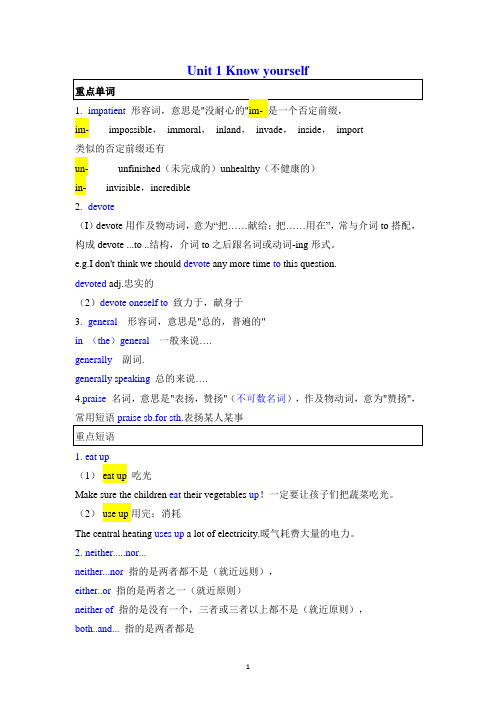
重点单词1.impatient形容词,意思是"没耐心的"im- 是一个否定前缀,im- impossible,immoral,inland,invade,inside,import类似的否定前缀还有un- unfinished(未完成的)unhealthy(不健康的)in- invisible,incredible2.devote(I)devote用作及物动词,意为“把……献给;把……用在”,常与介词to搭配,构成devote ...to ..结构,介词to之后跟名词或动词-ing形式。
e.g.I don't think we should devote any more time to this question.devoted adj.忠实的(2)devote oneself to致力于,献身于3.general 形容词,意思是"总的,普遍的"in (the)general一般来说….generally 副词.generally speaking 总的来说….4.praise 名词,意思是"表扬,赞扬"(不可数名词),作及物动词,意为"赞扬",常用短语praise sb.for sth.表扬某人某事重点短语1.eat up(1)eat up 吃光Make sure the children eat their vegetables up!一定要让孩子们把蔬菜吃光。
(2)use up用完;消耗The central heating uses up a lot of electricity.暖气耗费大量的电力。
2.neither.....nor...neither...nor 指的是两者都不是(就近远则),either..or指的是两者之一(就近原则)neither of 指的是没有一个,三者或三者以上都不是(就近原则),both..and...指的是两者都是就近原则指的是be 动词和行为动词的用法取决于距离较近的主语的单复数。
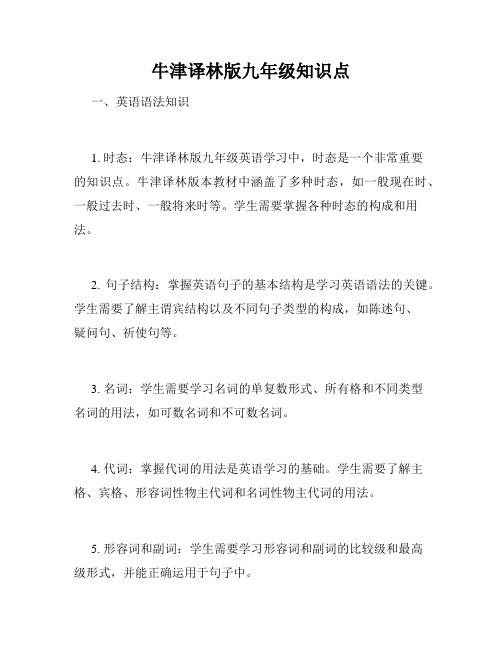
牛津译林版九年级知识点一、英语语法知识1. 时态:牛津译林版九年级英语学习中,时态是一个非常重要的知识点。
牛津译林版本教材中涵盖了多种时态,如一般现在时、一般过去时、一般将来时等。
学生需要掌握各种时态的构成和用法。
2. 句子结构:掌握英语句子的基本结构是学习英语语法的关键。
学生需要了解主谓宾结构以及不同句子类型的构成,如陈述句、疑问句、祈使句等。
3. 名词:学生需要学习名词的单复数形式、所有格和不同类型名词的用法,如可数名词和不可数名词。
4. 代词:掌握代词的用法是英语学习的基础。
学生需要了解主格、宾格、形容词性物主代词和名词性物主代词的用法。
5. 形容词和副词:学生需要学习形容词和副词的比较级和最高级形式,并能正确运用于句子中。
6. 介词:掌握介词的正确用法对学生的语言运用能力至关重要。
学生需要学习常见的介词用法,如in、on、at等。
7. 从句:学生需要学习条件状语从句、时间状语从句和同位语从句的构成和用法。
二、词汇积累1. 同义词和反义词:学生需要通过阅读教材中的文章来扩充词汇量,特别是一些常见的同义词和反义词。
2. 词汇记忆:学生需要通过各种方法来记忆生词和短语,如使用记忆卡片、创造语境、多次重复等。
3. 词汇运用:学生需要通过做各种练习题来巩固和应用所学的词汇。
三、阅读理解1. 阅读技巧:学生需要学习阅读理解的基本技巧,如快速浏览、重点阅读和理解文章的主旨等。
2. 阅读篇章:学生需要通过阅读篇章和文章来提高理解能力和阅读速度。
3. 题型分析:学生需要了解不同题型的要求和解题方法,如判断正误、选择正确答案、回答问题和填空等。
四、写作技巧1. 写作结构:学生需要学习如何合理组织和安排文章结构,包括开头、中间段落和结尾等。
2. 语言表达:学生需要学习如何用准确、流利和连贯的语言表达自己的观点和想法。
3. 写作练习:学生需要通过写作练习来提高写作能力,如写信、写日记、写作文等。
以上是牛津译林版九年级英语教材中的一些重要知识点,学生们需要通过课堂学习和课后练习来掌握这些知识点。
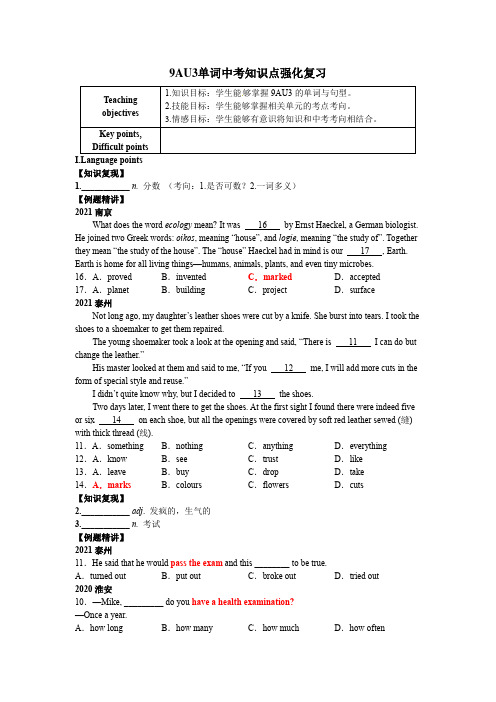
9AU3单词中考知识点强化复习1.知识目标:学生能够掌握9AU3的单词与句型。
2.技能目标:学生能够掌握相关单元的考点考向。
3.情感目标:学生能够有意识将知识和中考考向相结合。
【知识复现】1.___________n. 分数(考向:1.是否可数?2.一词多义)【例题精讲】2021南京What does the word ecology mean? It was 16 by Ernst Haeckel, a German biologist. He joined two Greek words: oikos, meaning “house”, and logie, meaning “the study of”. Together they mean “the study of the house”. The “house” Haeckel had in mind is our 17 , Earth. Earth is home for all living things—humans, animals, plants, and even tiny microbes. 16.A.proved B.invented C.marked D.accepted 17.A.planet B.building C.project D.surface2021泰州Not long ago, my daughter’s leather shoes were cut by a knife. She burst into tears. I took the shoes to a shoemaker to get them repaired.The young shoemaker took a look at the opening and said, “There is 11 I can do but change the leather.”His master looked at them and said to me, “If you 12 me, I will add more cuts in the form of special style and reuse.”I didn’t quite know why, but I decided to 13 the shoes.Two days later, I went there to get the shoes. At the first sight I found there were indeed five or six 14 on each shoe, but all the openings were covered by soft red leather sewed (缝) with thick thread (线).11.A.something B.nothing C.anything D.everything 12.A.know B.see C.trust D.like 13.A.leave B.buy C.drop D.take 14.A.marks B.colours C.flowers D.cuts【知识复现】2.___________adj. 发疯的,生气的3.___________n.考试【例题精讲】2021泰州11.He said that he would pass the exam and this ________ to be true.A.turned out B.put out C.broke out D.tried out2020淮安10.—Mike, _________ do you have a health examination?—Once a year.A.how long B.how many C.how much D.how often【知识复现】4.___________adv.或许,可能【例题精讲】2020淮安It was sunny last Friday. I arrived at the railway station at three in the afternoon. I would take the 16 to Shanghai to see my old friend Jack. But it was two hours 17 my train left. I thought it was the perfect time and place to look 18 an act of kindness to do.Outside the station, there was a girl having 19 for sale. I told her that I'd like to buy flowers for someone else, and that she could 20 who she will give the flowers to. She looked a little puzzled(困惑的), 21 I suggested that perhaps she could give the flowers to someone who looked a little 22 . That was because the flowers might cheer him or her up. 16.A.bus B.train C.plane D.underground 17.A.when B.before C.while D.after18.A.for B.at C.up D.into 19.A.tickets B.snacks C.fruits D.flowers 20.A.decide B.follow C.change D.praise【知识复现】5.__________vi. 处理【例题精讲】2020连云港12.___________ famous Chinese songs, such as The Love Song of Kangding and Jasmine Flowers, were sung during the concert.A.A number of B.The number of C.A great deal D.a great deal of 2020常州9.A great deal of my time is__________ with practicing playing the guitar.A.taken up B.made up C.put up D.set up2020连云港When asked by reporters on how to deal with difficulties, Xu calmly said, “Patience. When you can’t change anything, crying is useless, so just be 27 .”27.A.patient B.quiet C.relaxed D.active【知识复现】6.___________n. 选择【例题精讲】2022镇江10.Our school provides so many colourful afterschool activities on Fridays, but each student can only choose _______ two activities.A.at first B.at last C.at least D.at most2021常州7.—My family will go on a trip to Beijing this summer, but we haven’t decided ________. —Why not take the highspeed railway?A.when to leave B.how to get there C.which hotel to choose D.how long to stay there2022泰州Two years ago, his small town held its first yearly Back to School Party, offering needy families a____13____ to learn about free resources in the munity. Holmes, a warmhearted barber agreed to take part. Though he was very busy, he choose to donate his ____14____ to give free haircuts to needy kids so that they’d look tidy on that first chose to donate his day of school. 13.A.job B.thought C.possibility D.chance 14.A.money B.books C.time D.hair【知识复现】7.___________conj.&prep.除之外,只有【例题精讲】2021盐城2.All the cups over there are made ________ glass except the green one.A.of B.in C.by D.with2020镇江5.—Have you asked___________ about the case?—No, except Bob.A.everybody B.anybody C.nobody D.somebody【知识复现】8.___________adj.醒着的【例题精讲】2020常州5.—Jim, turn down the music. Our baby is sleeping.—Don’t worry. He__________ for half an hour.A.woke up B.has woken up C.was awake D.has been awake 2022徐州D.showers2020无锡1.Cheer up, son! You have friends here. You’re not ________.A.alone B.awake C.afraid D.asleep【知识复现】9.___________adv.几乎不【例题精讲】2020徐州11.You look the same now as you looked ten years ago. You’ve ________ changed.A.pletely B.hardly C.greatly D.already2022镇江11.Chinese women’s football team members worked _______ and won the Asian Cup. A.widely B.closely C.hardly D.simply【知识复现】10.___________vt.& vi 想象,设想【例题精讲】2021无锡13.—I don’t like the sleeping bag, Dad.—What do you ________, Bob? It’s a camp, not a hotel.A.suggest B.imagine C.expect D.wish2021淮安14.—Can you imagine ________ in 2035?—I’m sure it will be better.A.how our life was B.what will our life be likeC.how was our life D.what our life will be like2020南京2.China’s efforts to stop the spread of COVID19 will ________ the world’s ability to limit the harm in the near future.A.imagine B.invent C.insist D.improve【知识复现】11.___________vt. & n. 怀疑【例题精讲】2020常州10.—Do you want to try some wild duck?—__________. We should protect wild animals.A.No idea B.No problem C.No way D.No doubt2022无锡“Class, Jared helped the kittens out,” Mrs. Thomas announced. Everyone ___23___ .“Thanks,” whispered Jessica. “You’re the greatest.”23.A.doubted B.cheered C.regretted D.plained【知识复现】12.___________adj. 值得的,值钱【例题精讲】2021常州1.________ is better worth my respect than Yuan Longping. He is the pride of China. A.Somebody B.Anybody C.Nobody D.Everybody2020镇江10.A lot of museums in China are worth___________. If you have time, you can choose to go. A.visited B.visiting C.to visit D.visit【知识复现】13.___________n. 建议【例题精讲】2021泰州Just the other day, I was in a bookshop and found a book named How to make friends with foreigners. As a Canadian living in China for a year, I was curious to see what kind of advice a Chinese writer giving on this matter.One piece of advice really caught my attention and, I must say, made me feel quite angry. In the writer’s opinion, foreigners are an "opportunity (机会)" to improve your oral English; whenever you see a foreigner, American or English, you should practise speaking English withhim or her. If the foreigner doesn’t want to answer your questions, then he or she is a rude person who you wouldn’t want to spend time with anyway. I think this advice is not only incorrect, but also may harm the relationship between Chinese and foreigners in China.Like most other "Lao Wai" living in China, I know how lonely one can sometimes feel living in a culture different from our own familiar (熟悉的) ways. However, I simply accept as part of being here. So far my time in China has been rewarding. I have improved my Chinese language skills, learned about one of the fastest developing countries in the world today and made some very close Chinese friends.However, I have also met many Chinese people who consider me only as an "opportunity" to improve their oral English. I have had people following me from town to my flat to trouble me to teach them English. I have had plete strangers throwing articles or speeches in my face, insisting that I help them with the English translation. I have had people asking me nonstop questions for half an hour at the weekly English Corner ...Friendship for a lot of foreigners is about spending time with someone whose pany (陪伴) they really enjoy. So if there is any advice to give on making and keeping friendships with foreigners, I would say that it is this: Treat foreigners as people, not opportunities. Expect to make friendships step by step, over a period of time, not in a rush. ________ If your only reason for being fiends with a foreigner is to improve your English, then you will probably find that you don’t have a foreign friend for long.39.Where is the writer of this passage from?A.America B.China C.Canada D.England 40.Why is the writer of the passage interested in the book "H ow to make friends with foreigners"? A.Because he wants to have some more close Chinese Friends.B.Because he has greatly improved his Chinese language skills,C.Because no Chinese people would like to make friends with him.D.Because he wants to know about the Chinese writer’s advice on this topic.41.According to the writer of the book "How to make friends with foreigners", ________. A.his advice may make foreigners angryB.it is rude of you to ask a foreigner questionsC.you should choose a good foreigner to practise English withD.don’t waste time on a foreigner who doesn’t answer your questions42.In the fourth paragraph, the writer uses "I have had…" three times, because ________. A.he had no better sentences to express his ideas.B.he wanted to show how he hated to make friends with Chinese.C.he wanted to show how he hated to be treated as an “opportunity”.D.he met Chinese who wanted to make friends with him only three times.43.Which sentence may be the best to fill in the "________" in the last paragraph?A.True friendships stand (经得起) the test of time.B.Learn about different cultures to make real friends.C.Friends are about opportunities or personal advantages.D.There’s real friendship between people from different countries.【知识复现】14.___________n. 原因15.________adj. 严格的,严厉的【例题精讲】2021连云港10.Drinking tea is usually seen as a ________ lifestyle in China.A.strict B.boring C.clean D.healthy【知识复现】16.___________n.课业17.___________adj.宝贵的;贵重的【例题精讲】2020镇江She inspired (激发) me to make up many stories and became my partner in my travels. In this way, we travelled together. Some readers may think it 23 to have such a relationship, but dog owners like me will know it's true and understand.23.A.incorrect B.proper C.valuable D.impossible【知识复现】18.___________n. 清单19.___________n.友谊【例题精讲】2022泰州10.Read the Tang poem A spring morning on the right. Its theme is about ________.A spring morningMeng HaoranThis spring morning in bed I’m lying. Not wake up till I hear birds crying. After one night of wind and showers. How many are the fallen flowers!A.history B.sights C.friendship D.festivals【知识复现】20.___________pron. 谁21.___________n. 安静,沉默【例题精讲】2021盐城9.In many countries, people put their fingers up to their mouths ________ silence.A.ask for B.asking for C.to ask for D.asked for2020无锡I never cried. I never said a word. I didn’t tell the teacher because I didn’t want to get them in trouble. They 21 thought I was stupid. I didn’t want to add “unkind” to the list. I just closed the box and sat in 22 for the rest of the lunch period.21.A.once B.only C.almost D.already 22.A.silence B.support C.surprise D.success【知识复现】22.___________n.方法23.___________vt.解决24.___________n.字典25.___________n.回答,答复26.___________n.化学【例题精讲】2022无锡The bell rang, and the class went out for a break. When Jared passed the empty box, he saw kitten treats. He then had a(n) ___21___ . He threw the treats on the floor. A kitten came out. Jared waited until it was eating. Then another... Soon the other kittens were eating. Jared gently put them in the box.21.A.idea B.answer C.rest D.guess【知识复现】27.___________n. 进展,进步【例题精讲】2020连云港4.The___________ of the meeting is to help teachers and parents achieve better munication. A.position B.progress C.period D.purpose2020苏州2.— Wow, you’ve made so much progress in drawing.— Thanks. I _________ two online courses this winter holiday.A.took B.will take C.take D.was taking2022连云港From then on, they got up and played swords ____25____ the rooster began crowing. They kept their words day after day. They never gave up no matter how ____26____ in winter or hot in summer. Besides, they began to study history ____27____ and put all their energy into reading books. ____28____ , they learned a great deal of knowledge and made much progress. A few years later, ____29____ of them grew up with talents and wisdom. At last, their ____30____ came true and they made great contributions to their country.25.A.as well as B.as much as C.as good as D.as soon as 26.A.long B.dry C.cold D.quiet 27.A.carefully B.politely C.probably D.recently 28.A.In this way B.By the way C.In their way D.On his way 29.A.either B.all C.both D.neither 30.A.mistakes B.dreams C.hobbies D.difficulties【知识复现】28.__________adj. 担心的,烦恼的29.___________ adv. 大声地【例题精讲】2022无锡On the first morning of a new term, Jared remembered the things he didn’t like about school: Jessica, maths and reading aloud.2021南京To improve your reading, you can try the form of readers’ theatre, a formatted script for readers to read aloud. It’s so interesting!Cast of Characters: Narrator, Kayla, Ms. Lee, ZackNarrator: On a sunny day in southern Texas, Ms. Lee’s students gathered in the school playground.Ms. Lee: Tomorrow is the day of the sidewalk(人行道)chalkart festival. The principal has allowed us to practise our wetchalk drawing on the playground sidewalk, which will be our studio.Remember, whenever you want to draw on a sidewalk, always ask an adult in charge for permission before you draw. Now let’s review the steps of wetchalk drawing. What do we do first?Narrator: As the students told her the steps in order, Ms. Lee wrote them on a large pad of paper. When she finished writing, she pulled the paper off the pad and displayed the directions so everyone could read them. Then the students chose and soaked (浸湿)their pieces of chalk. Meanwhile, Kayla and Zack planned their drawing.Kayla: Let’s draw a jungle feast. Parrots can be eating all kinds of fruit.Zack: I’ll draw a model train carrying food to the birds.Narrator: The students removed their pieces of chalk from the water and drew. As Zack drew a sweeping curve of train track, his hand knocked over the jar of water. He and Kayla watched water streak across their drawing.Zack: Our drawing is ruined(毁坏)!Kayla: Don’t be so worried! Quick, mix the water and the chalk together! Now let’s use more chalk and smear(涂抹)it around.Narrator: Kayla and Zack worked quickly. The smeared colours looked glorious, like rich, thick frosting on a cake.Ms. Lee: That looks great! That’s a special method you’re using, kids. Are you two interested in taking part in the chalkart festival tomorrow? The timetable for the festival says that drawing starts at 9:00 a.m.Kayla and Zack: Sure!Kayla: Tomorrow we’ll pour water over our drawing on purpose.Zack: Then we’ll know just what to do!32.What do we know about readers’ theatre?A.A place for readers to enjoy plays.B.A reading material for people to read aloud.C.A series of steps for children to draw on the sidewalk.D.A number of people gathering together to play games.33.What does the underlined word “ streak” in the passage mean?A.Rise rapidly.B.Move quickly.C.Disappear suddenly.D.Swim slowly. 34.The narrator in the readers’ theatre ________.A.tells the whole story in a silent way B.gives instructions to the characters C.helps the characters understand the story D.describes settings and events35.What does the underlined sentence “Tomorrow we’ll pour water over our drawing on purpose.” at the end of the passage mean?A.Kayla and Zack will ruin their drawing with water for fun.B.Kayla and Zack will find the steps by accident by themselves.C.Kayla and Zack will draw as well as their teacher by pouring water.D.Kayla and Zack will draw pictures using the method they discovered today.【知识复现】30.___________vt.发音31.___________n.发音【例题精讲】2020镇江9.My English teacher is a___________ lady and she often corrects my pronunciation again andagain.A.patient B.creative C.modest D.curious2020常州7.A factory will be built for the __________ of this type of new energy car.A.position B.population C.production D.pronunciation 2021扬州Something turned Jo round. She happened to see Amy throw up her hands and go down, with a scaring cry. The ice 23 . Jo tried to call Laurie, but her 24 was gone. She tried to rush forward, but her feet seemed to have no 25 in them. Laurie’s voice cried out, “Bring a rail(横杆), Jo. Quick, quick!”23.A.broke B.froze C.shook D.gathered 24.A.sound B.pronunciation C.voice D.courage 25.A.energy B.strength C.challenge D.noise【知识复现】32.___________adv. 正确地33.___________vt. 提及,说起【例题精讲】2021常州9.—Thanks a lot for taking care of my boy when I was away.—________. We had great fun together.A.All the best B.Good idea C.That’s right D.Don’t mention it34.______________________使人受不了35.______________________考试得高/低分36.______________________解决问题37.______________________熬夜38.______________________保持清醒39.______________________待在户外40.______________________值得做某事41.______________________陷入困境42.______________________ 对某人严格要求43.______________________列一张…的清单44.______________________算出;解决45.______________________让某人了解…46.______________________根据47.______________________嘲笑某人48.______________________在…上取得进步49.______________________复习;回顾50.______________________大声读英语51.______________________把烦恼留在心中52.______________________对…不满意53.______________________与我们同龄54.______________________不客气。

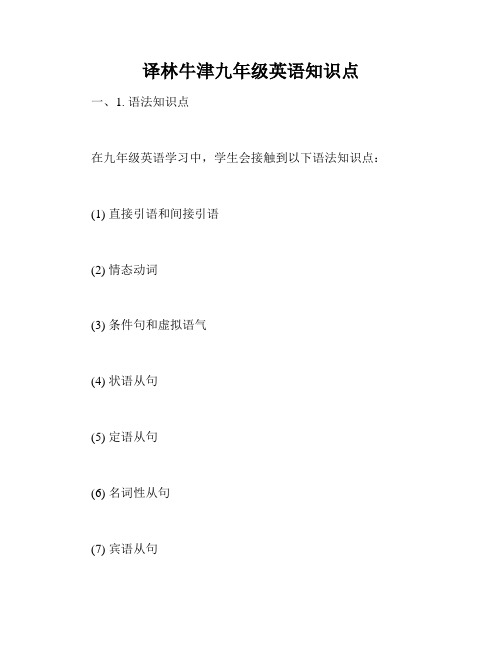
译林牛津九年级英语知识点一、1. 语法知识点在九年级英语学习中,学生会接触到以下语法知识点:(1) 直接引语和间接引语(2) 情态动词(3) 条件句和虚拟语气(4) 状语从句(5) 定语从句(6) 名词性从句(7) 宾语从句(8) 主语从句(9) 动词的时态和语态(10) 句型转换2. 单词和词组九年级英语学习中,学生需要掌握各种单词和词组,如:(1) 各类常用动词、名词、形容词等(2) 介词短语(3) 常见的短语动词(4) 数词和量词(5) 形容词和副词的比较级与最高级(6) 并列连词和转折连词3. 句型结构在九年级英语学习中,学生需要掌握各种句型结构,如:(1) 祈使句(2) 肯定句和否定句(3) 一般疑问句和特殊疑问句(4) 句子强调结构(5) 句子倒装结构4. 阅读技巧阅读技巧:(1) 理解文章主旨(2) 掌握推理判断能力(3) 学会查找关键词(4) 了解词义的猜测(5) 注意文章结构和段落(6) 阅读速度的控制(7) 总结、归纳和整理信息5. 写作技巧写作技巧:(1) 利用课堂学习的语法知识进行表达(2) 合理运用各种句型和词汇(3) 注意句子及段落之间的衔接关系(4) 注意使用恰当的过渡词和短语(5) 注意语法的准确性和连贯性(6) 善于运用写作模板和范文进行练习(7) 多读、多写、多积累范文和素材二、总结通过对九年级英语的知识点进行归纳和总结,可以清晰地了解到九年级英语学习的要点。
在学习过程中,需要掌握语法知识点、单词和词组、句型结构、阅读技巧以及写作技巧等方面的内容,通过积极学习和实践来提高自己的英语水平。
希望同学们能够认真学习、灵活运用,并通过不断练习和实践,取得优异的成绩。
加油!。
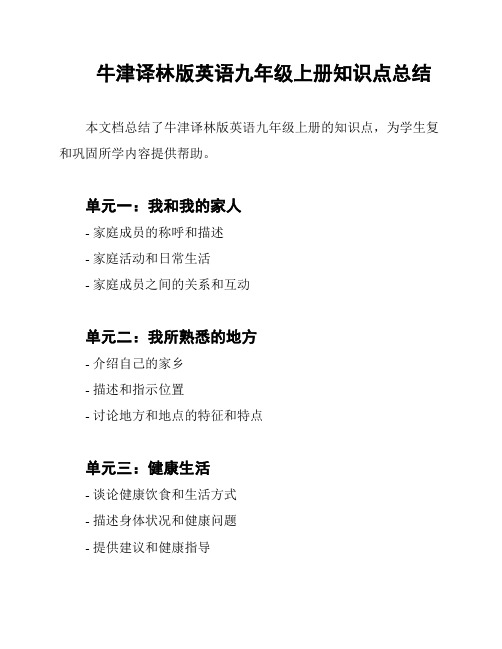
牛津译林版英语九年级上册知识点总结
本文档总结了牛津译林版英语九年级上册的知识点,为学生复和巩固所学内容提供帮助。
单元一:我和我的家人
- 家庭成员的称呼和描述
- 家庭活动和日常生活
- 家庭成员之间的关系和互动
单元二:我所熟悉的地方
- 介绍自己的家乡
- 描述和指示位置
- 讨论地方和地点的特征和特点
单元三:健康生活
- 谈论健康饮食和生活方式
- 描述身体状况和健康问题
- 提供建议和健康指导
单元四:乐观与坚持
- 讨论积极心态和乐观情绪
- 描述面对困难时的坚持和挫折- 分享成功故事和启示
单元五:世界之旅
- 介绍不同国家和文化
- 讨论旅行和旅游经历
- 描述地理特征和旅游景点
单元六:未来规划
- 讨论未来的职业和生涯规划- 提供职业建议和就业技巧
- 探讨理想和梦想的实现
单元七:科技与创新
- 探讨科技对生活和社会的影响- 介绍科技的发展和创新成果- 讨论科技伦理和责任
单元八:挑战自我
- 描述克服困难和挑战自我的经历
- 讨论个人成长和进步
- 分享研究方法和技巧
单元九:环保与可持续发展
- 探讨环境保护和可持续发展的重要性
- 分析环境问题和解决方案
- 提倡环境友好的生活方式
以上是牛津译林版英语九年级上册的知识点总结,希望对学生复习和备考有所帮助。
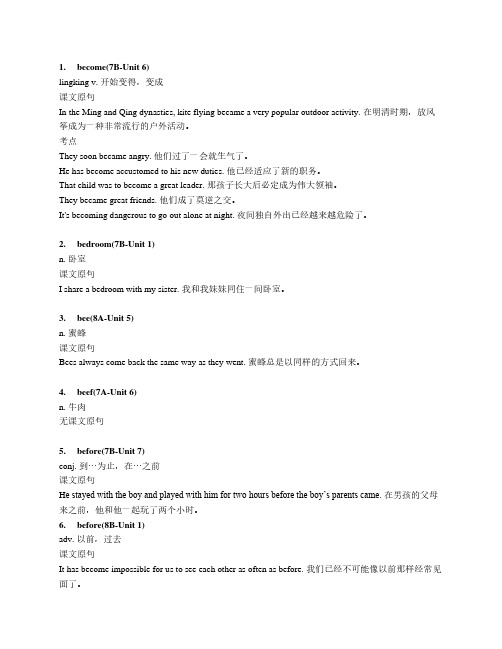
1.become(7B-Unit 6)lingking v. 开始变得,变成课文原句In the Ming and Qing dynasties, kite flying became a very popular outdoor activity. 在明清时期,放风筝成为一种非常流行的户外活动。
考点They soon became angry. 他们过了一会就生气了。
He has become accustomed to his new duties. 他已经适应了新的职务。
That child was to become a great leader. 那孩子长大后必定成为伟大领袖。
They became great friends. 他们成了莫逆之交。
It's becoming dangerous to go out alone at night. 夜间独自外出已经越来越危险了。
2.bedroom(7B-Unit 1)n. 卧室课文原句I share a bedroom with my sister. 我和我妹妹同住一间卧室。
3.bee(8A-Unit 5)n. 蜜蜂课文原句Bees always come back the same way as they went. 蜜蜂总是以同样的方式回来。
4.beef(7A-Unit 6)n. 牛肉无课文原句5.before(7B-Unit 7)conj. 到…为止,在…之前课文原句H e stayed with the boy and played with him for two hours before the boy’s parents came. 在男孩的父母来之前,他和他一起玩了两个小时。
6.before(8B-Unit 1)adv. 以前,过去课文原句It has become impossible for us to see each other as often as before. 我们已经不可能像以前那样经常见面了。

牛津译林中考英语综合复习(苏州中考试卷:笔试总分100分;考试时间100分钟)一、单项填空(共15小题;每小题1分,满分15分)解题时间:10分钟★★单项选择解题注意事项★★单项选择属于考查各项基础知识的传统题型,此题内容涉及语法、词汇、惯用法、句型等方面。
此题灵活,答题时要注意:1.读懂全句,首尾照应。
►You’d bette r _______ snacks to the party, for the teachers maytake them away.A. takeB. to takeC.not takeD. not to take【解析】根据had better not do sth最好不做某事,选C。
2.注意习惯用语,看清句意。
►-Hello, may I speak to Amy? -Yes, _______.A. my name is AmyB. I’m AmyC. this is Amy speakingD. Amy’s name【解析】根据所给的情景,我们可以看出这是打电话的开头语。
按照打电话的习惯用语,此题应补上自我介绍的答语。
故应选C。
3.排除干扰,认真分析。
答题时一定要认真审题,排除干扰,不要只根据表面形式,而轻易地选取答案。
要仔细分析整个句子所要表达的真正内容,对答案进行逐个筛选,直到找出正确答案。
►She was going to arrive in Suzhou _______Tuesday, but she didn’treach Changshu Wednesday.A. on; onB. on;beforeC. on;afterD. on;until有些同学一看题目就立刻选A做答案,其实只要我们具体分析一下,就不难看出后半句是not…until句式,所以此题答案应选D。
★对于“单项填空”题应从习惯用语、固定句式、句意、语境、语法等方面进行推理、排除、选择。
单选例题如下:◆单选-考查时态与语态◆◆Her son _____ the army for two months.She misses him very much.A.has joinedB.has been inC.joinedD.was in【解析】答案B;考查时态及非延续性动词及延续性动词替换。
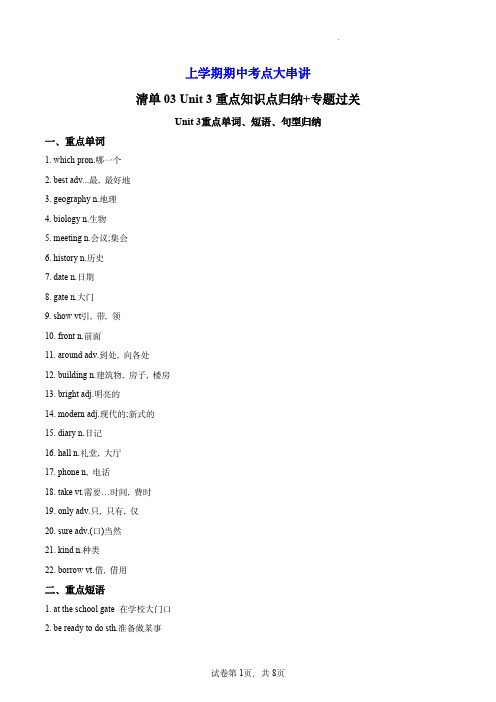
上学期期中考点大串讲清单03Unit3重点知识点归纳+专题过关Unit3重点单词、短语、句型归纳一、重点单词1.which pron.哪一个2.best adv...最,最好地3.geography n.地理4.biology n.生物5.meeting n.会议;集会6.history n.历史7.date n.日期8.gate n.大门9.show vt引,带,领10.front n.前面11.around adv.到处,向各处12.building n.建筑物,房子,楼房13.bright adj.明亮的14.modern adj.现代的;新式的15.diary n.日记16.hall n.礼堂,大厅17.phone n,电话18.take vt.需要…时间,费时19.only adv.只,只有,仅20.sure adv.(口)当然21.kind n.种类22.borrow vt.借,借用二、重点短语1.at the school gate在学校大门口2.be ready to do sth.准备做某事3.show sb.around our school领某人参观我们学校4.in front of在…前面5.far away from远离6.clean and bright干净明亮7.have meeting s there在那儿开会8.play with sb.和某人玩耍9.after class下课后10.say hello/goodbye to sb.向某人问好/向某人道别11.on the phone通电话12.all kinds of各种各样的13.borrow sth.from sb.向某人借某物14.on one's way back在某人回来的路上15.a few一些,少量16.which of the subjects其中哪一门学科17.on the Open Day在开放日18.the parents'meeting家长会19.watch two of our lessons观看我们两节课20.meet at the school ga te在校门口会面21.look beautiful/modern/young看上去漂亮/现代化22.the man in a white shirt穿着白色衬衫的那个男子23.so big如此大24.on the g round floor在一楼25.this way走这边26.have an art room有一间美术室27.the building over there那边的楼房28.the school hall学校礼堂29.on this/that day在这一/那一天30.let me see让我想想31.after class下课后32.tell sb.about sth.告诉某人某事33.like to do sth.喜欢做某事34.get to school到校35.from..to..从...至...36.get up起床37.sing the English song唱英文歌曲38.take a bus to school乘公交车去上学39.the photos/pictures of my friends我朋友们的照片40.play with sb.after school放学后和某人一起玩耍41.can't hear you well听不清你讲话42.walk to school=go to school on foot步行去上学43.live near our school住在我们学校附近44.be open from8a.m.to5:30p.m.从上午8点到下午5点半开放45.cross the road过马路46.thanks for sth./doing sth.感谢某事/做某事47.reading room阅览室48.all the best一切顺利,万事如意三、重点句型1.Which of the subjects do you like best?这些科目中你最喜欢哪一个?2.——What's the date9October.“今天几号?”“今天是十月九号3.Let me show you around.让我带你四处看看吧。
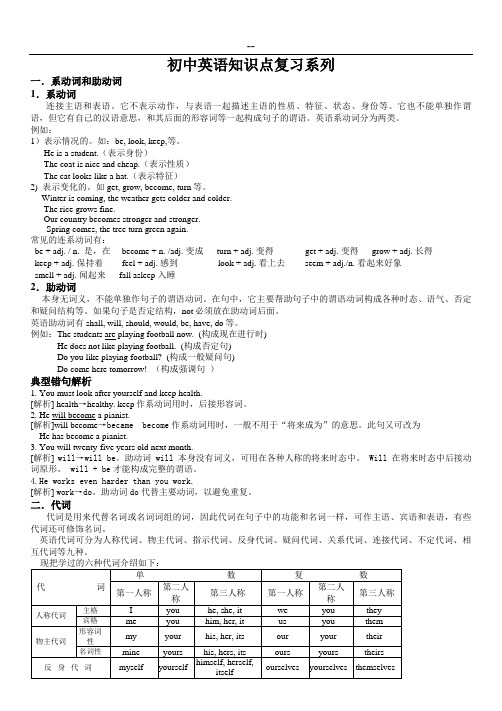
初中英语知识点复习系列一.系动词和助动词1.系动词连接主语和表语。
它不表示动作,与表语一起描述主语的性质、特征、状态、身份等。
它也不能单独作谓语,但它有自己的汉语意思,和其后面的形容词等一起构成句子的谓语。
英语系动词分为两类。
例如:1)表示情况的。
如:be, look, keep,等。
He is a student.(表示身份)The coat is nice and cheap.(表示性质)The cat looks like a hat.(表示特征)2) 表示变化的。
如get, grow, become, turn等。
Winter is coming, the weather gets colder and colder.The rice grows fine.Our country becomes stronger and stronger.Spring comes, the tree turn green again.常见的连系动词有:be + adj. / n. 是,在 become + n. /adj. 变成 turn + adj. 变得get + adj. 变得 grow + adj. 长得keep + adj. 保持着feel + adj. 感到 look + adj. 看上去seem + adj./n. 看起来好象smell + adj. 闻起来 fall asleep 入睡2.助动词本身无词义,不能单独作句子的谓语动词。
在句中,它主要帮助句子中的谓语动词构成各种时态、语气、否定和疑问结构等。
如果句子是否定结构,not必须放在助动词后面。
英语助动词有shall, will, should, would, be, have, do等。
例如:The students are playing football now. (构成现在进行时)He does not like playing football. (构成否定句)Do you like playing football? (构成一般疑问句)Do come here tomorrow! (构成强调句)典型错句解析1. You must look after yourself and keep health.[解析] health→healthy. keep作系动词用时,后接形容词。
keep相关短语辨析(keep-kept)※keep (on)doing sth继续,重复做某事◇keep sb doing sth使某人一直做某事☆keep sb.from sth保护,使免受☆keep...in order使...保持井然有序☆keep in touch with...与...保持联系◆keep off远离☆keep worries to oneself把烦恼闷在心里◇keep one’s word/promise信守诺言◇keep a record保持纪录◇keep a secret保守秘密◆带out的短语◆☆work out算出;解决;制定;锻炼(vi.)★try out for sth参加...选拔(或试演)※try on试穿☆hand out分发;提出◆point out指出,说明☆carry out 开展;执行☆be tired out精疲力尽☆stay out待在户外;(晚上)不回家※stay up熬夜★cut out剪出※cut...short缩短※cut down砍倒※cut in(on sb./sth.)打断(谈话),插嘴☆find out发现◇find one's way out找到出路◇give out分发(vt.);用光(vi.) ◇put out◇come out◇turn out证明是(vi.)◇run out用光;跑出来◇break out爆发◇go out出去;熄灭◇look out留神,当心☆out of control失去控制,无法管理◇out of breath上气不接下气◆in相关短语辨析◆★be in a bad mood情绪不好※in high spirits情绪高涨※in general总的来说;大体上※in all 总共,总计※in fear of one's life为生命安全担忧※in prison坐牢※in a hurry急忙,赶忙※in the middle of在......中间※in your dreams你做梦,你妄想※in common共同之处☆in shape健康≠out of shape◇in order≠out of order◇in trouble处于麻烦中◇in danger处于危险中=at risk※there’s danger有危险☆hand in上交,递交=turn in★guard against (doing)sth防范,提防(某事)◇在春季可以使用什么方法来提防感冒?What methods can be used to guard against catching a cold in spring?◆重点动词等用法◆1.make sb do sth→被动:be made to do sth被迫做某事※近义:force sb to do sth→被动:be forced to do sth被迫做2.have sb do sth使某人做某事※get sb to do sth使某人去做某事★have sth done使某物被做=★get sth done★★★◇她试图使她的教练改变主意,但是失败了。
She tried to get her coach to change his mind, but she failed.3.would rather not do sth宁愿不做某事★4.had better (not)do sth最好(不)做某事★it’s better (not)to do sth(不)做某事比较好5.Would you please (not)do sth?能不能请你(不)做某事?表示建议还有:Why not do sth?=Why don’t you do sth?6.see/notice/hear sb do sth→被动:be seen/noticed/heard to do sth7.※see/notice/hear sb doing sth→被动:be seen/noticed/heard doing sth被看到/听到正在做8.★be well worth doing sth很值得做某事≈be worth sth★★★◇长城很值得参观。
The Great Wall is well worth a visit/visiting.9.★be of great value to sb =be very valuable to sb对...宝贵的10.prefer to do sth rather than do sth宁愿做某事,而不愿做某事=prefer doing sth to doing sth=would rather do sth than do sth★★★※prefer A to B 比起B,更喜欢A=like sth better※prefer过去式preferred11.promise to do sth答应做某事►promise not to do sth★★★►make/keep/break a promise12.remind sb (not) to do sth提醒某人(不)去做某事→被动:sb+be+reminded to do sth※ remind sb of (doing) sth提醒某人某事13.prove to do※prove sth+adj.►prove the suspect guilty14.mean to do sth打算做某事※mean doing sth意味着做某事★meaningful(adj.)≠meaningless(adj.)→meaning(n.)意思15.encourage sb to do sth鼓励某人做某事→被动:sb+be+encouraged to do sth※注意:encouragement(n.)鼓励16.be supposed to do sth 应该做某事★Suppose/Supposing(假设) we can’t ge t the necessary equipment,what would we do?17.allow sb (not) to do sth允许某人(不)做某事★→被动:sb+be+allowed to do sth※allow doing sth18.expect to do sth预计做某事◇expect sb (not) to do sth期望某人(不)做某事→被动:sb+be+expected to do sth19.warn sb (not) to do sth 警告某人(不)做某事→被动:sb+be+warned (not)to do sth※warning(n.)警告20.welcome sb to do sth欢迎某人做某事★※be welcomed by sb被某人欢迎※You’re welcome.=Not at all.=Don’t mention it.=It’s a pleasure./My pleasure.不客气21.(can)afford to do sth 能做某事★※can't afford to do sth负担不起做某事22.refuse to do sth拒绝做某事23.fail to do sth未能做成某事※failure (n.)24.agree to do sth同意做某事※agreement(n.)25.happen/chance to do sth碰巧做某事=It happens that...26.seem to do 好像做某事=It seems that+句子27.cause sb/sth to do sth引起某人做某事※...的原因the cause of...=the reason for...28.influence sb to do sth影响某人做某事29.depend on sb to do sth依靠某人做某事※depend on取决于※base...on./be based on/upon基于30.the way to do sth=the way of doing sth做某事的方法※the answer to the question/the way to sp/※the key to the door/the solution to doing sth31.be the first/the last/the third to do第一个/最后一个...做32.to do表示目的/做表语►What else should I pay attention to to improve my Maths?►One way to solve your health problem is to take more exercise and eat less sweet food.33.hope to do sth希望做某事=hope that+句子※常用动名词用法1.★★devote one's time/energy/attention to doing sth致力于做某事※devotion(n.)☆devote oneself to doing sth=be devoted to doing sthmit oneself to doing sth专注做★★※commit crimes犯罪3.insist on doing sth坚持做某事→被动:insist on being done►He insisted (坚持认为)that he had never seen the camel.※insist that sb (should) do sth/that sb/sth (should) be done.4.be/get used to (doing)sth 习惯于(做)某事★★★※used to do sth过去常常做某事(现在不再做)→被动:used to be done※否定didn’t use to/usedn’t to※be used to sth (被)用来做某事=be used for doing sth※use sth to do sth使用某物做某事※use(v./n.)-useful≠useless(adj.)※make full/good use of利用=take advantage of※be in use=be in service在使用中※be used as (被)当做….来用※be used by +人※be of some use to sb/sth=be useful to sb/sth对...有用★5.sth needs doing sth=sth needs to be done(物做主语)★※sb need/needs/needed (sb)to do sth某人需要(某人)去做※needn’t do sth=don’t have to do sth不必做★there is no need for sb to do sth6.keep/stop/ prevent sb from doing sth阻止某人做某事→被动sth +be+prevented/kept from doing sth (to do表目的)7.★consider doing sth考虑做某事→consider not doing★consider sb to be/as...认为某人是...→be considered as/to be...※considering(prep.)考虑到,鉴于※consideration(n.)考虑8.miss doing sth错过做某事※miss being done错过被做9.avoid doing sth避免做某事10.imagine doing sth想象做※imagine that/imagine sb to be/as★imagination(n.)想象力※imaginative(adj.)富有想象力11.mind one's/sb doing sth介意做某事※mind being done★Do you mind being treated rudely?12.pay attention to doing sth 注意做某事★★※pay back偿还※pay off还清;成功※pay a visit to拜访,参观※pick up采集;拾起;接收;接送;偶然学会13.suggest doing sth建议做某事※suggest that sb/sth (should) (not) do sth14.recommend doing sth推荐做※recommend sb for sth/recommend sth to sb★recommend that sb (should) (not) do sth15.have trouble/difficulty/problems (in) doing sth有困难做某★※have trouble/difficulty/problems with sth►你在向我们解释这个句子上有什么困难吗?Do you have any difficulty explaining the sentence to us?►我必须得立即找人处理这个问题。